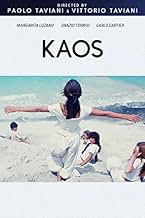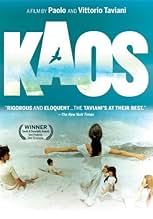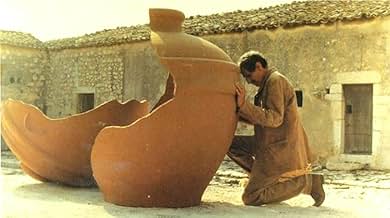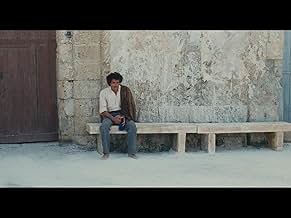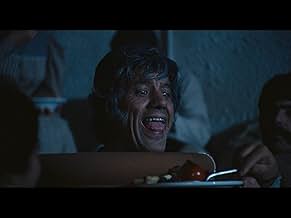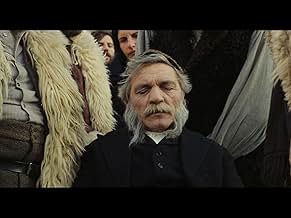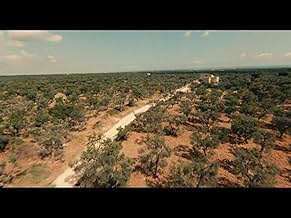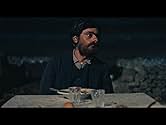AVALIAÇÃO DA IMDb
7,8/10
3,3 mil
SUA AVALIAÇÃO
Adicionar um enredo no seu idiomaFive stories by Luigi Pirandello set in turn-of-the-century Italy.Five stories by Luigi Pirandello set in turn-of-the-century Italy.Five stories by Luigi Pirandello set in turn-of-the-century Italy.
- Direção
- Roteiristas
- Artistas
- Prêmios
- 4 vitórias e 8 indicações no total
Regina Bianchi
- Madre di Pirandello (segment "Colloquio con la madre")
- (as Régina Bianchi)
Avaliações em destaque
Which, unfortunately is impossible for three hours. I've seen it two times in the cinema. The characters are so good, and are given all the time and space to develop starting with MariaGrazia. I really can't think of a movie that's made with more love and dedication. La Giara is a rare but welcome break and watch how Franchi and Ingrassia interact, watch the beauty of baby Bata's eyes in Mal di Luna. Just find out all those details and you won't be disappointed. Having seen Italy after watching KAOS was a feast of recognition, it's really like that, the villages where time stands still, the people, go and see it and you won't be disappointed.
10wobelix
Once Sicily was the center of our western world, and this film shows us all the beauties of far, far away, together with a Pastorale worthy of a Beethoven Symphony.
No No, Nicola Piovani composed the unforgettable music all by himself.
This film is timeless, with an imagery, thanks to master Giuseppe Lanci, that is as well sober as breathtakingly beautiful.
There is not one weak actor and the stories are from Luigi Pirandello, who aimed to make one gorgeous novella for each day of the year.
KAOS of the Taviani-brothers could, or maybe even should, be watched every day of the week. This must truly be the most beautiful cinematic achievement ever.
No No, Nicola Piovani composed the unforgettable music all by himself.
This film is timeless, with an imagery, thanks to master Giuseppe Lanci, that is as well sober as breathtakingly beautiful.
There is not one weak actor and the stories are from Luigi Pirandello, who aimed to make one gorgeous novella for each day of the year.
KAOS of the Taviani-brothers could, or maybe even should, be watched every day of the week. This must truly be the most beautiful cinematic achievement ever.
I saw Kaos, yesterday evening with friends who didn't know it or don't remember it. At this time, Italian cinema produces masterpieces. The emotional power acts after years, specially during the "novel" ends this movie, when Pirandello : at his top, comes back into the family house, re-open it, sees again, the only women he loves and remembers his trip, his family, his feelings : the splendor of childhood, the wildness of this isle, the warm of being protected & loved by his entire family in dramatic circumstances... Well : the music was written by Mozart himself. The beginning of this part is a kind of "Sergio Leone period : once upon in time..." a western like "I"m back" without guns and an harmonica. No action, but only emotion which grows again & again My POW ? A very great movie upon Sicilia, Mens, Women, family, land... See by two directors who knows emotion in movies are more important than 3D effects... God (Ford & Griffith) bless them Sorry my American & English are poor, but I'm just a french guy. See this movie and enjoy it (don't forget a bunch of Kleenex) you will never see that again.
Kaos is one obvious masterpiece of the Taviani brothers. Unfortunately I can not explain the title. But I don't think there is a clear explanation or important message in any of the stories either, in contrast with Kobayashi's Kwaidan (1964), which consists clearly of four stories about ghosts. Kaos seems to deal with family or legacy in general. There are five fairy-tales from Luigi Pirandello about ordinary people and the curious small worlds (or illusions) they find themselves in. I'm not going to reveal exactly what happens in the stories. It's just fantastic and a little nostalgic to watch the strange events and behaviour of different people for three hours without fancy special FX. Credit to cinematographer Giuseppe Lanci (Nostalghia, 1983) and composer Nicola Piovani of course, who did a surpassing job. The performances of the actors are great and never overdone. That wouldn't be appropriate for such a sober work of cinema that could have taken place 200 years ago. It may be not an important film, but it IS unforgettable, timeless and will become one of your personal favourites.
10 points out of 10 :-)
10 points out of 10 :-)
Artfully directed, lusciously photographed, and magnificent scored (in fact, I would say Nicola Piovani's music for this movie is some of the finest I've ever heard in my life), "Kaos" nevertheless leaves something to be desired when it comes to the five tales it tells. The first one, "L'Altro Figlio", is the strongest one emotionally, but it's also quite predictable after a point; you will guess why the mother has denounced her "other son" before it is revealed. The second, "Mal Di Luna", has an intriguing premise, but goes pretty much nowhere with it; when it's over, we're back to where we started. The third, "La Giara", is surprisingly my favorite: it's too slowly paced to work as a comedy, but it works better as an allegory, and it builds to an exhilarating musical sequence that is better seen than described. Besides, it's fascinating to watch the famous Italian comic duo Franco and Ciccio, both noticeably older, acting more mature than you may have ever seen them before! The fourth tale, "Requiem", is, frankly, tedious, and the weakest of the five. The epilogue, "Colloquio Con La Madre", is the part I was most looking forward to, mainly because of Pauline Kael's description of it as a "full-blown epiphany that sends you out dazed and happy". It takes quite some time to reach to that point, but yes, the way this story captures a life-defining moment of sheer happiness will stay in my mind for a long time. Despite my reservations, the experience of seeing and, above all, listening to this movie is not one to be missed. *** out of 4.
Você sabia?
- CuriosidadesThe title of the movie comes from a quote of Luigi Pirandello, the author of the book the movies is based on. Pirandello used to say to be a "son of chaos", since he was born in Càvusu, a small village, whose name came from the Greek "Kàos", "chaos".
- Versões alternativasTheatrical release in Italy did not include the segment "Requiem".
- ConexõesEdited into Bellissimo: Immagini del cinema italiano (1985)
Principais escolhas
Faça login para avaliar e ver a lista de recomendações personalizadas
- How long is Kaos?Fornecido pela Alexa
Detalhes
Bilheteria
- Faturamento bruto nos EUA e Canadá
- US$ 325.717
- Fim de semana de estreia nos EUA e Canadá
- US$ 11.412
- 17 de fev. de 1986
- Tempo de duração
- 3 h 7 min(187 min)
- Mixagem de som
- Proporção
- 1.85 : 1
Contribua para esta página
Sugerir uma alteração ou adicionar conteúdo ausente



